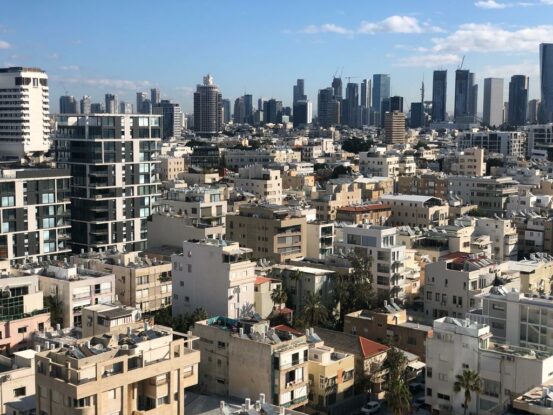The Israel Tax Authority issued a memorandum last week that includes a series of amendments to the real estate tax laws, whose stated goal is to increase the supply of apartments by various means. Among the measures proposed, are those taxes applied to buyers and sellers who do not live in Israel, in the hope that some of them will decide to sell their apartments thereby increasing the supply of apartments in the market.
According to Israel Tax Authority (ITA), there are currently 83,000 apartments in Israel owned by non-residents, of which 40,000 are located in the two most sought-after cities — Tel Aviv and Jerusalem. Today, foreign homeowners enjoy various tax exemptions and lower rates that apply to Israeli sole homeowners. However, ITA has stated that “these are exceptional exemptions compared to other countries, especially today, given a limited supply of residential apartments for Israeli residents and high price levels”. With the amendments proposed, the breaks in real estate taxes for foreign residents are now set to change.
Real estate taxes for foreign residents
Currently, for example, foreign residents selling apartments purchased before Jan 1, 2014 are eligible for a beneficial Capital Gains Tax rate (Mas Shevach — a tax levied on the increase in the value of the apartment during the period of ownership, realized when the property is sold). According to the proposal, this beneficial tax rate will be canceled. The change will not take effect until the beginning of 2024, thereby granting foreign residents a two-year period in which to sell their apartments with the existing tax benefit.
Another benefit that foreign residents have received until now is an exemption from tax on rental income, up to a certain threshold. This too is set to be canceled.
Holding two apartments when buying and selling
Another interesting amendment seeks to encourage homebuyers who are upgrading or downgrading their homes to swiftly sell their old apartments, after purchasing a new apartment. Currently, a household that has purchased a new apartment may continue to hold the old apartment for a period of two years, without being considered to have purchased an investment apartment (a status that demands higher real estate taxes). In a market where home prices are rising regularly, many people take advantage of the situation and hold their old apartment for as long as possible in order to enjoy the increase in value. According to the proposed amendment, the period in which households will be able to own two apartments simultaneously will be cut in half, to 12 months, in order to incentivize homebuyers to quickly release their old apartments to the market.
Capital Gains Tax on land held for over 20 years
Another proposal included in the memorandum aimed at increasing the supply of apartments is a reduction in Capital Gains Tax imposed on land purchased before November 7, 2001. The value of land held for over 20 years has accumulated significantly and capital gains are vast. These capital gains are currently taxed at an average rate of around 40% upon the sale of land. The ITA believes that these high tax rates may discourage landowners from selling. Therefore, according to the amendment, over the next 3 years, Capital Gains Tax will be significantly reduced for a landowner who sells land that is zoned for residential purposes, provided that construction begins during the eight years following the sale of the land.
“Luxury” tax on high-income earners
Besides the aim of increasing supply, some of the measures are also intended to increase State revenues. For example, the imposition of an additional tax imposed on high-income earners upon the sale of an apartment that is not exempt from capital gains tax (for example, not a sole residence or a property received through inheritance which qualifies for an exemption). According to this proposal, anyone earning more than NIS 660,000 per year is considered to be a “high-income earner”. Until now, those that fall into this category have been required to pay an additional “luxury” tax on their income from wages or from the capital markets, above this threshold, but not on the profit earned through the sale of apartments. Now the State also intends to levy this tax on the profits from the sale of non-exempt properties.
No tax break on “shell” apartments
Another proposed change that will increase State revenues is an amendment that aims to close a tax loophole that has been exploited by wealthy individuals when purchasing a second home, or an investment property, in a “shell” state, i.e. that has no internal finish. In such a case, instead of purchasing a finished “apartment”, the buyer purchases an empty space and completes the construction of the internal walls, bathrooms, kitchen, etc. independently. Until now, purchasers of shell apartments have been able to purchase at a lower Purchase Tax rate of 6% rather than the 8-10% rate for an additional residential property, on the grounds that they are not actually purchasing a residential apartment. The amendment seeks to put an end to this and charge homebuyers the same tax rate whether the apartment is finished or not.
Updated Purchase Tax thresholds for 2022
Israel Tax Authority also released the annual Purchase Tax thresholds for 2022 last week. A revision in the Purchase Tax brackets is published annually in mid-January, in order to reflect the change in the Home Price Index. The upward adjustment in the tax brackets, reflecting the sharp increase in home prices in the past year, has slightly reduced the tax for purchasers of a single apartment who are residents in Israel. For example, when purchasing a single apartment at a price of NIS 2.2 million, according to the current rates a purchase tax of NIS 14,682 will now be due which is more than three thousand shekels less than that which was due in 2021. (Use our Purchase Tax Calculator to calculate the tax due on your property in Israel).
The update also applies to real estate taxes for foreign residents and those purchasing investment apartments, such that up to NIS 5.525 million will be taxed at 8% compared to NIS 5.348 million last year, and the balance beyond that amount will be taxed at a rate of 10%. However, it is highly doubtful that these buyers will find the update significant, since the tax was recently increased from starting at 5% to a starting rate of 8% beginning November 2021, such that this change will not make a significant impact.
Reviewed by Adv. Jane Olman.








